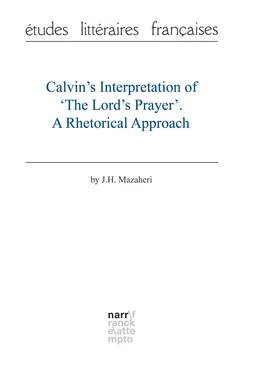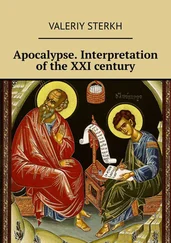Professor J.H. Mazaheri - Calvin's Interpretation of 'The Lord's Prayer'. A Rhetorical Approach
Здесь есть возможность читать онлайн «Professor J.H. Mazaheri - Calvin's Interpretation of 'The Lord's Prayer'. A Rhetorical Approach» — ознакомительный отрывок электронной книги совершенно бесплатно, а после прочтения отрывка купить полную версию. В некоторых случаях можно слушать аудио, скачать через торрент в формате fb2 и присутствует краткое содержание. Жанр: unrecognised, на английском языке. Описание произведения, (предисловие) а так же отзывы посетителей доступны на портале библиотеки ЛибКат.
- Название:Calvin's Interpretation of 'The Lord's Prayer'. A Rhetorical Approach
- Автор:
- Жанр:
- Год:неизвестен
- ISBN:нет данных
- Рейтинг книги:4 / 5. Голосов: 1
-
Избранное:Добавить в избранное
- Отзывы:
-
Ваша оценка:
- 80
- 1
- 2
- 3
- 4
- 5
Calvin's Interpretation of 'The Lord's Prayer'. A Rhetorical Approach: краткое содержание, описание и аннотация
Предлагаем к чтению аннотацию, описание, краткое содержание или предисловие (зависит от того, что написал сам автор книги «Calvin's Interpretation of 'The Lord's Prayer'. A Rhetorical Approach»). Если вы не нашли необходимую информацию о книге — напишите в комментариях, мы постараемся отыскать её.
Calvin's Interpretation of 'The Lord's Prayer'. A Rhetorical Approach — читать онлайн ознакомительный отрывок
Ниже представлен текст книги, разбитый по страницам. Система сохранения места последней прочитанной страницы, позволяет с удобством читать онлайн бесплатно книгу «Calvin's Interpretation of 'The Lord's Prayer'. A Rhetorical Approach», без необходимости каждый раз заново искать на чём Вы остановились. Поставьте закладку, и сможете в любой момент перейти на страницу, на которой закончили чтение.
Интервал:
Закладка:
J.H. Mazaheri
Calvin’s Interpretation of ‘The Lord’s Prayer'. A Rhetorical Approach
Narr Francke Attempto Verlag Tübingen
[bad img format]
© 2018 • Narr Francke Attempto Verlag GmbH + Co. KG
Dischingerweg 5 • D-72070 Tübingen
www.francke.de• info@francke.de
Das Werk einschließlich aller seiner Teile ist urheberrechtlich geschützt. Jede Verwertung außerhalb der engen Grenzen des Urheberrechtsgesetzes ist ohne Zustimmung des Verlages unzulässig und strafbar. Das gilt insbesondere für Vervielfältigungen, Übersetzungen, Mikroverfilmungen und die Einspeicherung und Verarbeitung in elektronischen Systemen.
E-Book-Produktion: pagina GmbH, Tübingen
ePub-ISBN 978-3-8233-0100-4
Acknowledgments
Three chapters of this book appeared earlier in the following journals: Chapter I (“Our Father in Heaven”) in Revue d’Histoire Ecclésiastique 106, 3–4, 2011, 440–451; Chapter II (“Hallowed be Thy Name”) in Freiburger Zeitschrift für Philosophie und Theologie 60, 2, 2013, 396–403; and Chapter III (“Thy Kingdom Come”) in Zwingliana 40, 2013, 101–111. I thank the respective editors for permission to reprint them. I am also grateful to the College of Liberal Arts at Auburn University, for the subvention award I received, to Professor Rainer Zaiser, of Kiel University, for publishing this book in ‘Études littéraires françaises’, as well as to Mrs. Kathrin Heyng, of Gunter Narr Verlag, for all her help.
Introduction
‘The Sermon on the Mount’ is the longest speech delivered by Jesus in the Gospels , taking up three entire chapters (5–7) in the Gospel of Matthew . The “essence” of Christianity is most eloquently expounded in these chapters. Now the subject of prayer is situated in the middle of it (6: 5–14), and ‘The Lord’s Prayer,’ a model of prayer offered by Christ, exactly at the center of the sermon. This prayer, being the most significant one for Christians of all groups and denominations, has evidently brought about countless publications and interpretations, from the greatest theologians to the most common preachers in the world throughout the history of Christianity. John Calvin’s exegesis of it, in his Institutes of Christian Religion and in his Commentaries of the Bible, is no doubt among the most profound and influential ones. Fascinated by its depth and powerful presentation, I would like to share here with others my own reading of Calvin, based on his French works. Although the language of the 16 thcentury can still be considered Middle French, Calvin’s style announces the classical period by its precision, clarity, and methodical presentation. No wonder then, as Francis Higman rightly points out, that “Ever since the first appearance of Calvin’s writings in French, admiration has been expressed for his handling of that language (…). His friends admired his language. His ennemies did too, calling it seductive poison and so on …,” and that “J. Plattard described the 1541 Institutes as the ‘first monument of French eloquence’.”1
I. The Language of Prayer
The 20 thChapter of Book III of the Institutes of Christian Religion is devoted to prayer. Since the present essay only concerns the “Lord’s Prayer,” I put aside the author’s thorough introduction to prayer in general, and focus only on a few points regarding my limited subject. Calvin raises the double issue of hymns and language. With regard to the latter, criticizing the common habit of praying in Latin at church, he argues that when one prays in public , one ought to do it in the language everyone understands:
Dont aussi il appert que les oraisons publiques ne se doyvent faire n’en langage Grec entre les Latins, n’en Latin entre François ou Anglois (comme la coustume a esté par tout cy devant), mais en langage commun du pays, qui se puisse entendre de toute l’assemblée, puisqu’elles doyvent estre faites à l’édification de toute l’Eglise, à laquelle ne revient aucun fruit d’un bruit non entendu.1
The reason we pray in public being the “edification” of ourselves and others, it is evident (“il appert”) that we all need to understand what we are saying to God. Otherwise our prayer is useless, as we receive “no benefit” (“aucun fruit”) from it. These words are apparently addressed mainly to a preacher, who might not even care much about his congregation. Calvin’s idea concerning the language in prayer is actually inspired by saint Paul, to whom he explicitly refers. Indeed, the Apostle writes:
Therefore, one who speaks in a tongue, should pray for the power to interpret. For if I pray in a tongue, my spirit prays but my mind is unproductive. What should I do then? I will pray with the spirit, but I will pray with the mind also; I will sing praise with the spirit, but I will sing praise with the mind also. Otherwise, if you say a blessing with the spirit, how can anyone in the position of an outsider say the ‘Amen’ to your thanksgiving, since the outsider does not know what you are saying? For you may give thanks well enough, but the other person is not built up. (1 Corinthians 14: 13–17)2
Those who pray without understanding the words may be sincere and pray “with the spirit,” but this is not sufficient: they must understand what they say. In other words, the prayer has to be said with the “mind” too. Calvin shares this idea. Moreover, he himself happens to have the gift of “interpretation”. Although he refers to Paul concerning the language, he goes beyond the First Corinthians by alluding to insincere preachers, the ones who do not really care about others, or do not pray even with the “spirit”, let alone with the “mind”. The theologian addresses the latter by saying, “Encore ceux qui n’avoyent aucun esgard ny à charité ny à humanité se devoyent pour le moins esmouvoir un petit de l’authorité de sainct Paul, duquel les parolles sont assez évidentes…,” and by quoting the First Corinthians 14:16 ( Institution III, xx, 33, 375–76).3 Strange expectation though, for if someone, who prays in public, does it without “charité” or “humanité”, how could he care about Paul himself? I must also remind the fact that the former term (“charity”) has a religious connotation, being done for God’s sake, whereas the latter (“humanity”) is profane —it is done for human’s sake.
II. Public Prayer vs Private Prayer
First, praying without sincerity, whether in public or in private, is not only worthless, but also offensive to God. Calvin states that, “Toutesfois il nous faut tousiours penser qu’il ne se peut faire que la langue sans le cœur , soit en oraison particulière ou publique, ne soit fort déplaisante à Dieu. Davantage, que l’ardeur et véhémence du vouloir doit estre si grande, qu’elle outrepasse tout ce que peut exprimer la langue” ( Institution III, xx, 33, 376).1 The word “cœur” (heart) expresses the idea that we must truly feel what we are saying in our prayer, for without a pure heart and sincere love to God, it will not be heard by Him. A prayer is not genuine if it is devoid of ardor (“ardeur”), which implies devotion and fervor, as well as a passionate will (“véhémence du vouloir”). An important difference, however, is to be noted between the two kinds of prayer: whereas we must utter words out loud when we pray with others, we can be silent when we are alone with God. Praying in silence is then possible insofar as our desire to communicate with God and our “vouloir” (willingness and eagerness to pray) are more important than the words themselves. Besides, the prayer ought to “outrepasse tout ce que peut exprimer la langue” (“to surpass all that the tongue can express by speaking”). And lastly,
Читать дальшеИнтервал:
Закладка:
Похожие книги на «Calvin's Interpretation of 'The Lord's Prayer'. A Rhetorical Approach»
Представляем Вашему вниманию похожие книги на «Calvin's Interpretation of 'The Lord's Prayer'. A Rhetorical Approach» списком для выбора. Мы отобрали схожую по названию и смыслу литературу в надежде предоставить читателям больше вариантов отыскать новые, интересные, ещё непрочитанные произведения.
Обсуждение, отзывы о книге «Calvin's Interpretation of 'The Lord's Prayer'. A Rhetorical Approach» и просто собственные мнения читателей. Оставьте ваши комментарии, напишите, что Вы думаете о произведении, его смысле или главных героях. Укажите что конкретно понравилось, а что нет, и почему Вы так считаете.












